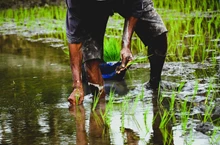
The National Mission for Clean Ganga hosted the 8th edition of the Webinar Series 'Igniting Young Minds, Rejuvenating Rivers' yesterday (8th July). The webinar's theme was 'Afforestation.' The Webinar series is being organised with the goal of connecting with the youth about the critical issue of Ganga Rejuvenation.
Asok Kumar, Director General of the National Mission for Clean Ganga, presided over the meeting. Dr. Bhushan Dewan, Vice-Chancellor, Sridhar University, Pilani; Professor Dharam Budhi, Vice-Chancellor, Uttaranchal University, Dehradun; Dr. Sudesh Kumar Sohani, Vice-Chancellor, IES University, Bhopal; and Dr. Nand Kishore Sinha, Vice-Chancellor, Maharaja Agrasen Himalayan Garhwal University were among the panelists.
Asok Kumar, Director General, National Mission for Clean Ganga, gave the keynote address and discussed the various steps being taken to achieve the Nirmal (pollution abatement) Ganga and Aviral (maintaining e-flow in the river) Ganga targets by taking a basin-level approach. To ensure that no untreated sewage flows into the Nirmal Dhara. There are 161 sewerage infrastructure projects that have been sanctioned, with 83 completed and the rest in various stages of completion. Kumar stated that biodiversity conservation and afforestation are also linked to this component of the Namami Gange Programme, and that focused efforts are being made in both areas.
He emphasized the importance of public participation in the Namami Gange Program's success. "We want to turn Namami Gange into a mass movement so that it can be sustained." Simultaneously, through Arth Ganga, we are establishing river-people connections via an economic bridge to ensure project sustainability. He stated that programmes such as river rafting, Incredible Ganga Walk, Ganga Run, and Ab Roz Hoga, Ghat Par Yoga are being organized to bring people together.
Kumar described afforestation as a "very important aspect of the Clean Ganga Project," emphasizing the role of plantation in preventing soil erosion, ensuring water availability, and combating climate change. Last year, more than 47 lakh rainwater harvesting structures were built and over 36 crore plantations were planted as part of the Catch the Rain campaign. He stated that so far, the plantation has been carried out on an area of approximately 33,000 hectares under the Namami Gange Programme.
He emphasized the importance of planting native species that are appropriate for a given ecosystem, and he proposed creative ways to encourage young people to do so, such as Adopt a Tree and Plantation on Birthdays. He stated that we must protect these natural resources, which are a gift from our ancestors.
Dr. Bhushan Dewan discussed the importance of incorporating environmental science into all curriculums. Using Ganga Praharis as an example, he stated that university students should be involved in river rejuvenation projects such as Namami Gange and expressed his commitment to the cause. Professor Dharam Buddhi urged everyone to participate in the afforestation programme in order to preserve biodiversity. He believes that collaboration between academia and government will benefit the cause.
Dr. Sudesh Kumar Sohani stated that while we are working to revitalize and conserve rivers, we must first educate people about the importance of forests. He shared his experiences with river conservation and afforestation in various states. Dr. Nand Kishore Sinha stated that under the new education policy, children should be connected with environmental science in order to create interest in afforestation among the young generation.











